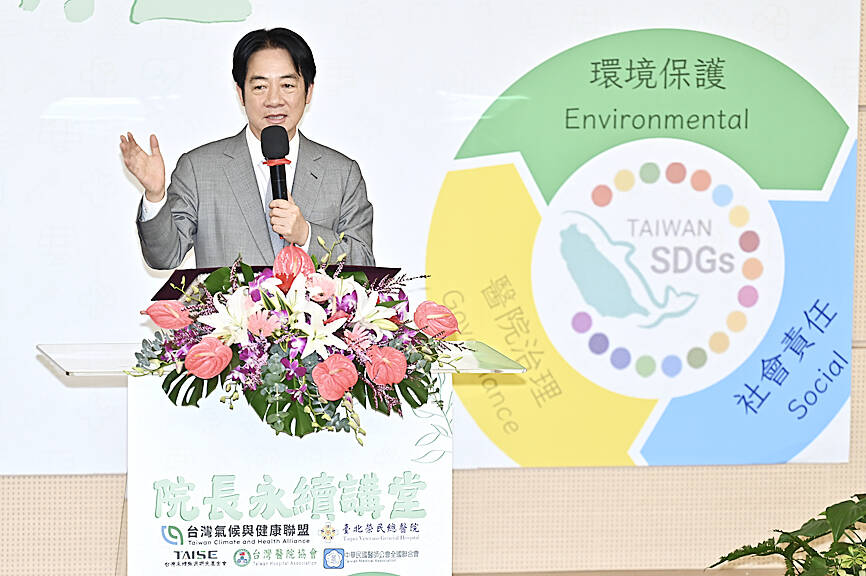The government plans to invest NT$900 billion (US$29.99 billion) into a safer energy transition, with more competitive industry, greater sustainability and a more resilient society, President William Lai (賴清德) said yesterday.
The government hopes the investment would spur NT$4 trillion in private-sector coinvestment, Lai said at a forum hosted by the Taiwan Climate and Health Alliance in Taipei.
The investments formed part of an initiative to make Taiwan more competitive and advanced through the development of artificial intelligence (AI) infrastructure, he said.

Photo: Tu Chien-jung, Taipei Times
“Many civic leaders have been calling for Taiwan to develop its own sovereign AI, particularly in healthcare, law and finance,” he said. “I hope that when Taiwan builds its own sovereign AI for the medical sector, it will receive strong support from the medical community.”
The turnout at the conference from many members of the medical community seemed to suggest such support, and also demonstrated the nation’s commitment to health for all, he said.
The president also discussed climate change, calling it a major challenge for the current generation and the next.
Lai last year established the National Climate Change Response Committee at the Presidential Office to bring together the efforts of various sectors toward promoting sustainable development, he said.
Climate change has brought extreme weather, including typhoons and flash floods from intense rainfall, as well as heat waves and rising temperatures that have increased the spread of infectious diseases and affected food security, he said.
“Climate change has had a profound impact on human health, survival and everyday life,” he said, adding that everyone must contribute to mitigate its effects.
Achieving net zero emissions by 2050, first pledged by former president Tsai Ing-wen (蔡英文), remains Taiwan’s long-term sustainability goal and has not changed despite geopolitical shifts, Lai said.
Since last year, the Ministry of Health and Welfare has promoted a net zero carbon emissions program for medical institutions, and has assisted 40 hospitals to complete carbon inventories, he said.
“Meeting the challenge of climate adaptation is unavoidable, and this generation has a duty to take immediate action,” he said. “Toward that end, we must lay the groundwork for Taiwan’s net zero pathway, giving hope to the next generation, and helping them build the capability and resilience to face the severe challenges of climate change.”
Lai, who was a physician at National Cheng Kung University Hospital before entering politics, said that he hopes to lead the government in supporting the medical community.
“You are on the front line, and I am here in the back to assist,” he told forum attendees.
Citing examples of actions taken by his administration to improve public health and welfare, Lai said the government had established a NT$10 billion replenishable fund for new drugs, and a nearly NT$50 billion, five-year initiative called the Healthy Taiwan Sprout Project.
In his closing remarks, he urged the medical community to engage more in the biomedical sector.
“If the medical, biomedical and technology sectors work together, Taiwan’s biomedical industry can gain global attention,” he said.

POSITIVE DEVELOPMENT: Japan and the US are expected to hold in-depth discussions on Taiwan-related issues during the meeting next month, Japanese sources said The holding of a Japan-US leaders’ meeting ahead of US President Donald Trump’s visit to China is positive news for Taiwan, former Japan-Taiwan Exchange Association representative Hiroyasu Izumi said yesterday. After the Liberal Democratic Party’s landslide victory in Japan’s House of Representatives election, Japanese Prime Minister Sanae Takaichi is scheduled to visit the US next month, where she is to meet with Trump ahead of the US president’s planned visit to China from March 31 to April 2 for a meeting with Chinese President Xi Jinping (習近平). Japan and the US are expected to hold in-depth discussions on Taiwan-related issues during the

‘LIKE-MINDED PARTNER’: Tako van Popta said it would be inappropriate to delay signing the deal with Taiwan because of China, adding he would promote the issue Canadian senators have stressed Taiwan’s importance for international trade and expressed enthusiasm for ensuring the Taiwan-Canada trade cooperation framework agreement is implemented this year. Representative to Canada Harry Tseng (曾厚仁) in an interview with the Central News Agency (CNA) said he was increasingly uneasy about Ottawa’s delays in signing the agreement, especially as Ottawa has warmed toward Beijing. There are “no negotiations left. Not only [is it] initialed, we have three versions of the text ready: English, French and Mandarin,” Tseng said. “That tells you how close we are to the final signature.” Tseng said that he hoped Canadian Prime Minister Mark Carney

President William Lai (賴清德) yesterday bestowed one of Taiwan’s highest honors on Saint Vincent and the Grenadines (SVG) Ambassador Andrea Clare Bowman in recognition of her contributions to bilateral ties. “By conferring the Order of Brilliant Star with Grand Cordon on Ambassador Bowman today, I want to sincerely thank her, on behalf of the Taiwanese people, for her outstanding contribution to deepening diplomatic ties between Taiwan and SVG,” Lai said at a ceremony held at the Presidential Office in Taipei. He noted that Bowman became SVG’s first ambassador to Taiwan in 2019 and

A man walks past elementary school artworks at the Taipei Lantern Festival in Ximen District yesterday, the first day of the event. The festival is to run from 5pm to 10pm through March 15.